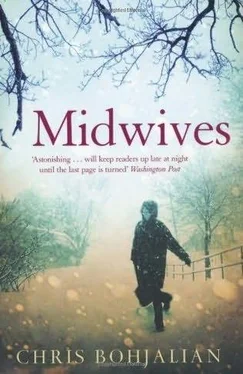Chris Bohjalian - Midwives
Здесь есть возможность читать онлайн «Chris Bohjalian - Midwives» весь текст электронной книги совершенно бесплатно (целиком полную версию без сокращений). В некоторых случаях можно слушать аудио, скачать через торрент в формате fb2 и присутствует краткое содержание. Жанр: Современная проза, на английском языке. Описание произведения, (предисловие) а так же отзывы посетителей доступны на портале библиотеки ЛибКат.
- Название:Midwives
- Автор:
- Жанр:
- Год:неизвестен
- ISBN:нет данных
- Рейтинг книги:5 / 5. Голосов: 1
-
Избранное:Добавить в избранное
- Отзывы:
-
Ваша оценка:
- 100
- 1
- 2
- 3
- 4
- 5
Midwives: краткое содержание, описание и аннотация
Предлагаем к чтению аннотацию, описание, краткое содержание или предисловие (зависит от того, что написал сам автор книги «Midwives»). Если вы не нашли необходимую информацию о книге — напишите в комментариях, мы постараемся отыскать её.
Midwives — читать онлайн бесплатно полную книгу (весь текст) целиком
Ниже представлен текст книги, разбитый по страницам. Система сохранения места последней прочитанной страницы, позволяет с удобством читать онлайн бесплатно книгу «Midwives», без необходимости каждый раз заново искать на чём Вы остановились. Поставьте закладку, и сможете в любой момент перейти на страницу, на которой закончили чтение.
Интервал:
Закладка:
TANNER: Is a cesarean section a surgical procedure?
DANFORTH: Obviously
TANNER: Do you think you're qualified to perform this surgery?
DANFORTH: In even my worst nightmares, I never imagined I'd have to.
TANNER: I'll repeat my question. Do you think you're qualified to perform this surgery?
DANFORTH: No, and I've never said that I thought I was.
TANNER: And yet you did. With a kitchen knife, on a living woman, you-
DANFORTH: I would never endanger the mother to save the fetus-
TANNER: You didn't endanger the mother, you killed-
HASTINGS: Objection!
Perhaps I should have been surprised that by the end of the trial my father had any hair left at all. In photographs taken the following winter, his hair looks as if it has begun to gray, but the sideburns are as prominent as ever.
My mother's calling-to her it was never a job or even a career-meant that my father was much more involved with me as a child than the fathers of most of my friends were with them. There was always a long list of baby-sitters pressed against the refrigerator door with a magnet, and occasionally I did indeed wind up with my mother at somebody's delivery, but birth is as unpredictable as it is time-consuming, and my father often filled the Connie-care breach. After all, I was an only child and my mother would have to disappear for twelve hours, or a day, or a day and a half at a time.
My father wasn't much of a playmate when it came to dressing dolls or banging plastic pots and skillets around my toy kitchen (actually, he wasn't very good with regular cast-iron or metal ones either), but he was creative when I needed new voices for trolls, and extremely handy when it came to building a permanent playhouse from wood, or a temporary one from card tables and bed sheets. He would usually endure whatever program I wanted to watch on television, even if it meant an irritating struggle adjusting the rabbit ears atop the television set for a full fifteen minutes before my show began. (Reception in our part of Vermont then was laughably poor. I remember a day one spring-when the baseball season had begun and the basketball and hockey seasons were in the midst of their endless play-offs-when my father was watching a basketball game through so much screen snow and fuzz that my mother sat down on the couch beside him, thumbed through a magazine for five or ten minutes, then looked up and inquired, "What sport is this?")
My father and I also spent a fair amount of time together driving around northern Vermont in his Jeep: Often he was chauffeuring Rollie and me to the bookstore or the toy shop in distant Montpelier, the tack shop in St. Johnsbury, or to some third friend's home in Hardwick or Greensboro or Craftsbury. One September and October, it seemed, he was driving us somewhere every single day, and then working at the dining-room table in our home all night to try and keep up with the work he was missing nine to five at his office: There had been a notable baby boom in the county that fall, roughly nine months after the coldest, harshest winter in years, and my mother was busy.
And although my father was unfailingly patient with me, and always at least feigned contentment at the prospect of another Saturday afternoon or Wednesday evening with only an eight- or a nine-year-old child for company, I know the demands of my mother's calling strained their marriage. When they fought, and I remember them fighting most when I was in elementary school and at that age when I was at once young enough to need virtually constant supervision by someone and old enough to understand on some level the dynamics of what was occurring, their arguments would filter up through the registers in the ceilings of the rooms on the first floor of our house.
"She needs a mother, dammit!" my father would snap, or "You're never here for her!" or "I can't do this alone!" Against all experience, he continued to believe he could use me as a trump card to convince my mother to stay home. It never worked, which usually compelled him to change his tactics from guilt to threats:
"I didn't marry you to live in this house all alone!"
"A marriage demands two people's attention, Sibyl."
"I will have a wife in this world, Sibyl. That's a fact."
At the beginning of these fights, my mother always sounded more perplexed and hurt than angry, but underneath that initial sadness in her tone was a stubbornness as unyielding as Vermont granite. She could no sooner stop delivering babies than people could stop having them.
But I also believe that my father deserves high marks for simply enduring all that he did: The husbands of most midwives don't put up with their spouses' hours for long, especially once they are fathers themselves, and most of my mother's midwife friends had been divorced at least once.
Usually my parents' arguments ended in silence, often because my father was incredulous:
"Wait a minute. Didn't the baby arrive at six in the evening?" I might hear my father asking.
"Yup. Julia. Such a pretty girl."
"It's past nine o'clock! What the hell have you been doing for the last three hours?"
"Folding baby clothes. You know I love folding baby clothes."
"You were folding baby clothes for three hours? I suppose the parents own a store that sells baby clothes?"
"Oh, for God's sake, Rand. You know I didn't stay there just to fold baby clothes. I wanted to make sure everyone was okay. It is their first child, you know."
"So how long did you spend-"
"Thirty minutes, Rand. I probably spent thirty minutes actually folding Onesies and Julia's tiny little turtlenecks."
"But you did hang around for three hours-"
"Yes, I did. I made sure Julia was nursing, and Julia's mom was up and around. I made sure the family had plenty of food in the refrigerator, and the neighbors were planning to bring by casseroles for the next few days."
"And you made sure the baby's clothes were folded."
"You bet," my mother might say, and I could see in my mind my father shaking his head in quiet astonishment. A moment later I would hear him leave the kitchen, where they might have been bickering, and go upstairs alone to their bedroom. Sometimes, later, I'd hear them make love as they made up: To this day, I remember the noise their bed made as among the most reassuring sounds I've ever heard.
Unfortunately, there were also those fights that would escalate and become ugly, sometimes because my father had been drinking. He might have been drunk when my mother returned, and she might have been tired and cranky. This was a combustible mix. And while my mother would never drink to catch up-her sense of responsibility as a midwife prevented her from drinking or smoking pot whenever she was on call-when she was hurt she could lash out with a fury that was both articulate and verbally violent. I never heard my parents slap or hit each other, but powered by bad scotch and exhaustion, they'd say things as wounding as a fist. Maybe even more so. I'd hear expressions and exchanges I didn't understand at the time but that frightened me nonetheless because I knew someday I would.
I never told Rollie the details of my parents' fights, but I told her enough that one day she gave me some advice that served me well: Every so often, replace an inch or so of the Clan MacGregor with an inch or so of tap water. Be judicious if the bottle is low, and always mark in your mind the exact spot on the label the fluid had reached-the hem of the bagpiper's kilt or the bagpipe itself, for example, or the bottom of the letters that spelled the scotch's brand name.
She had been doing this with her own parents for years, she said, and look at how well their marriage worked.
On those nights my father chose to smother his frustrations with scotch, my parents' fights were like powerful three A.M. thunderstorms: loud and scary, sometimes taking an agonizingly long time to blow over, but causing little apparent damage. When I would scan our yard in the morning after even an especially fierce and frightening August storm, the sunshine usually revealed only minor damage. Some of the white, late-summer blossoms from the hydrangea might be on the ground; a sickly maple might have lost a few leaves; behind our house, there might even have been a small branch from a tree in the woods, blown onto the lawn by the wind.
Читать дальшеИнтервал:
Закладка:
Похожие книги на «Midwives»
Представляем Вашему вниманию похожие книги на «Midwives» списком для выбора. Мы отобрали схожую по названию и смыслу литературу в надежде предоставить читателям больше вариантов отыскать новые, интересные, ещё непрочитанные произведения.
Обсуждение, отзывы о книге «Midwives» и просто собственные мнения читателей. Оставьте ваши комментарии, напишите, что Вы думаете о произведении, его смысле или главных героях. Укажите что конкретно понравилось, а что нет, и почему Вы так считаете.











